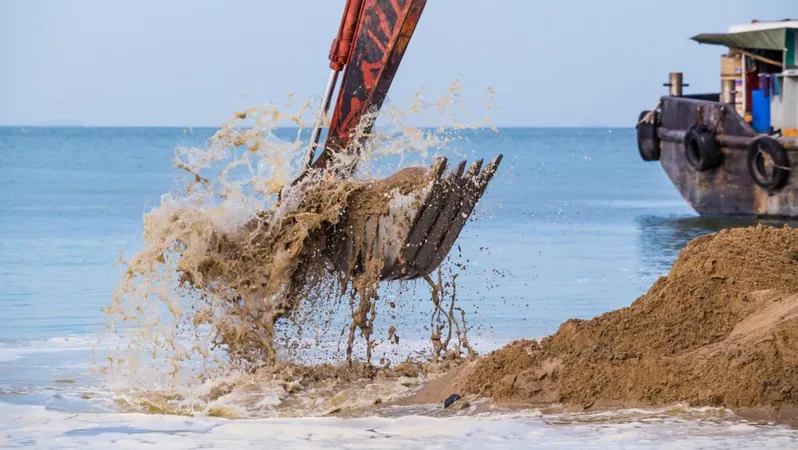
Indonesia's Controversial Sea Sand Export Decision: President Jokowi Faces Backlash Amidst Environmental Concerns
2024-09-19
Introduction
JAKARTA: The Indonesian government's recent decision to lift a long-standing export ban on sand has ignited fierce backlash from environmental activists and several political figures. Critics argue that this move risks harming the environment and poses grave social consequences for local communities.
Presidential Defense
In defense of the decision, President Joko Widodo clarified, “We are not exporting sea sand. What is allowed (to be exported) is sedimentation,” emphasizing that the export involves specific sediment deposits and not just any sand from coastal areas. This statement was made following the government's formal announcement on September 9, which revised the ban that had been in place for over 20 years.
Regulation Changes
The controversial regulation allows permit holders to export sand, pending that domestic needs have been adequately addressed. This change follows an earlier suggestion by President Widodo in May of the previous year that prepared the groundwork for this revision. At the time, environmental groups expressed their concerns fearing a detrimental impact on marine ecosystems—a sentiment that has echoed with the recent announcement.
Justifications and Skepticism
Local media reported that the government justified the new export policy as a necessary measure to manage sand and mud deposits that could otherwise interfere with marine ecosystems and navigation routes. However, environmental advocates remain skeptical of these claims.
Environmental Concerns
Greenpeace’s marine campaigner, Afdillah Chudiel, termed the reopening of sea sand exports a significant misstep for Widodo's administration, criticizing it as contributing to “ecological sins” just before the president's term concludes next month. He pointed out that the organization had anticipated this shift ever since the original announcement to permit sand exports was made in 2022.
Impact on Local Communities
Chudiel elaborated on the adverse consequences of sand mining, stating, “It can damage fishermen's fishing areas and contribute to food insecurity.” This is a notable concern in a nation where a significant portion of the population relies on fishing for their livelihood.
Historical Context
Historically, Indonesia was once the primary supplier of sea sand for Singapore's land reclamation projects until former President Megawati Soekarnoputri implemented a ban on such exports in 2003 due to environmental devastation, including potential submersion of smaller islands.
Regulation and Scrutiny
President Widodo’s administration insists that the current export will be heavily regulated, only allowing the extraction of sediment in specified regions across Java, Kalimantan, and the Riau Islands. However, activists argue that the definition of sedimentation is being manipulated to disguise the actual purpose of the export. “This justification is merely a guise to facilitate sand mining and exports,” Chudiel commented.
Political Backlash
Critiques of the government's decision are widespread within the parliament, with opposition lawmakers accusing the administration of prioritizing economic gains over environmental sustainability. Legislator Deddy Yevry Sitorus from the Indonesian Democratic Party of Struggle expressed concerns that the policy serves the interests of a few rather than the public good.
Concerns Affecting Climate Progress
As the government continues to face allegations of weak oversight regarding this initiative, analysts have voiced fears that these actions could undermine Indonesia’s progress in combating climate change. Around 66 companies have reportedly registered to extract and export sea sand, raising alarm bells among those concerned about the potential consequences for coastal fishing communities.
Call for Repeal
As President Widodo prepares to hand over the reins to President-elect Prabowo Subianto on October 20, calls to revoke the sea sand export regulation are intensifying. Environmental advocacy groups and reform-oriented politicians alike warn that such policies could threaten Indonesia’s natural resources and coastal integrity, leading to severe long-term implications for both the environment and local livelihoods.
Conclusion
With a growing chorus of dissent and environmental concerns at the forefront, Indonesia's unfolding sea sand export saga continues to attract both local and international scrutiny. The implications of this policy shift could echo long after Widodo leaves office, impacting communities and ecosystems alike.


 Brasil (PT)
Brasil (PT)
 Canada (EN)
Canada (EN)
 Chile (ES)
Chile (ES)
 España (ES)
España (ES)
 France (FR)
France (FR)
 Hong Kong (EN)
Hong Kong (EN)
 Italia (IT)
Italia (IT)
 日本 (JA)
日本 (JA)
 Magyarország (HU)
Magyarország (HU)
 Norge (NO)
Norge (NO)
 Polska (PL)
Polska (PL)
 Schweiz (DE)
Schweiz (DE)
 Singapore (EN)
Singapore (EN)
 Sverige (SV)
Sverige (SV)
 Suomi (FI)
Suomi (FI)
 Türkiye (TR)
Türkiye (TR)